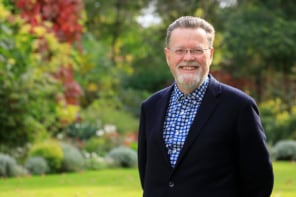Eddie Morland is the chief executive of the UK Health and Safety Laboratory, which provides scientific services to the Health and Safety Executive — the UK public body responsible for ensuring workplace health and safety

How did you originally get into physics?
I did maths, physics and chemistry A-levels, and I found physics the most interesting of the three. I chose not to go to university after finishing school because I wanted to get a job and earn some money. Instead, I did a part-time applied-physics degree at Manchester Polytechnic while working for the UK Atomic Energy Authority (UKAEA) as a junior researcher. It took a lot longer than a full-time degree, but it was a great to be able to apply the work from the course back in the laboratory.
What did your job at the UKAEA involve?
I was working on fracture mechanics, which studies why things break. I was looking at the steels involved in the construction of a new pressure vessel for the Sizewell B nuclear reactor in Suffolk. For the 1980s it was leading-edge stuff — we had some of the largest machines in the world. We were rotating steel cylinders 10 inch thick at 500 mph inside an enclosed oven at 353 °C while hitting the inside surface with cold water at a rate of 40 gallons per minute, and measuring the cracks that grew. That was the only way you could simulate a full-scale pressure vessel without pressurizing it. My training was slightly different to that of most other people in the field, who were mainly metallurgists. I had a slightly more mathematical and theoretical approach, which I found quite useful.
What did you do next?
After I had been with the UKAEA for about 12 years, I heard that the organization was going to move towards privatization, so I did a part-time MSc in management science to equip me for the commercial world. I then ended up at the corporate headquarters in Harwell as the key account manager, which meant that I was basically the point of contact for all our dealings with British Energy. In 1996 the company was privatized and bought British Rail Research in Derby. I became the deputy managing director of British Rail Research, which involved looking after about 300 staff. Shortly afterwards the company also bought the equivalent organization in the Netherlands, as well as other parts of British Rail and transport companies all over the world. I ended up as managing director there and eventually had about 1100 researchers to look after.
What does railway research involve?
It is a complicated interface between track and train — the train is basically balanced on a sixpence as it charges along at 120 mph, and you need to understand the reactions between the two. There’s also the mathematical problem of designing timetables and signalling systems.
How did you become involved with the Health and Safety Laboratory?
After the Hatfield disaster in 2000 [a train crash in which four people were killed], the rail industry went through a period of tremendous change and the company I worked for ultimately decided to leave the market, so I became available. A month or two later the job of chief executive of the Health and Safety Laboratory (HSL) came up.
What does the HSL do?
We provide scientific services to the Health and Safety Executive, and we also do work for private-sector companies and for other government departments. We look at how humans get sick or injured and how to prevent that happening; we look at what makes industrial plant — such as railways, aeroplanes or chemical factories — unsafe; and then we look at the human factors, which includes things like management processes, the management of stress and so on. So we’ve got everything from medical doctors looking at how people are exposed to chemicals, fire and explosion experts, right through to psychologists and social scientists. It’s a tremendously diverse scientific base.
What is your role there?
I have to manage the place and make sure we do the business. We try to make sure that we’re delivering customers what they want, pouring resources into the right kind of areas, and that we are paying our way.
Does your physics background help you?
Physics is a very broad based subject — you get into the habit of creating a model and then testing it, and you can do that across all sorts of disciplines. Understanding scientific methodology is also very useful when crossing disciplines, for example from the nuclear world into railways. Physics really gives you the backbone to query the quality of the science.
Do you still keep up with any physics?
I’m surrounded by a lot of physicists here, and I get to see a lot of the stuff they do on a day-to-day basis.


